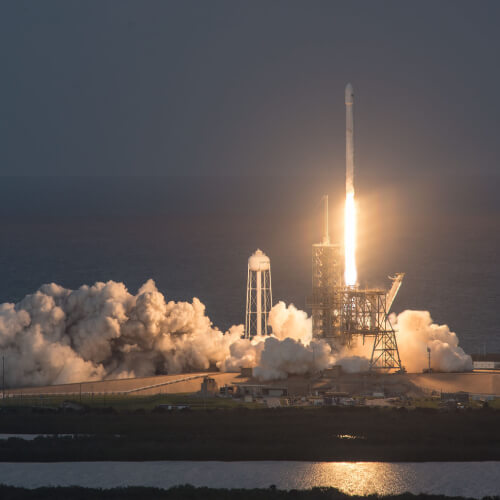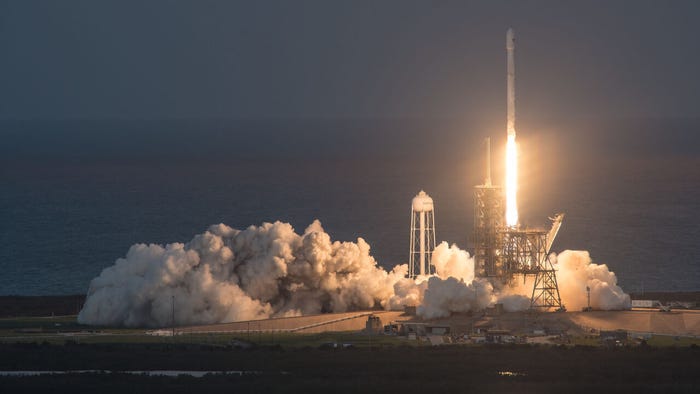
Starlink is both a lifesaver and a risk for Ukraine, say security experts.
Starlink is "the only non-Russian communications system still working in some parts of Ukraine, so probability of being targeted is high," Musk admitted in a tweet.
SpaceX activated its Starlink service in Ukraine and dispatched more terminals to the country on February 26, in response to a tweeted request from Ukraine's vice prime minister Mykhailo Fedorov.
"Starlink--here. Thanks, @elonmusk", Fedorov wrote on February 28, after the first shipment arrived. He added the connectivity "will save a lot of lives."
One user, an engineer in Kyiv named Oleg Kutkov, tweeted that he was getting download speeds of 136.76 Mbit/s, and occasionally more than 200 Mbit/s, after the arrival of his Starlink dish.
Figure 1:  SpaceX satellite launch.
SpaceX satellite launch.
(Source: SpaceX via SES media kit).
An unofficial map of Starlink satellites shows its constellation of 2,000 normally has several satellites over Ukraine, and there are gateway ground stations in nearby countries for broadband.
SpaceX is working on software updates to reduce power consumption, to allow Starlink dishes to run from automobile cigarette lighters, while also enabling mobile roaming so dishes can stay connected while on a moving vehicle, said Musk in a tweet.
Solar panels + battery pack better than generator, as no heat signature or smoke & doesn’t run out of fuel
— Elon Musk (@elonmusk) March 2, 2022
He also suggested solar panels and battery packs as better power sources than generators, since solar power lacked "heat signature or smoke and doesn't run out of fuel."
A target on a dish?
Musk asked users to turn on their terminals "only when needed and place antenna away as far from people as possible," and also advised them to "place light camouflage over antenna to avoid visual detection."
Some users have covered their dishes with fiberglass domes, spray painted them or covered them with cloth, according to one Twitter account.
But Russia has in previous conflicts used satellite communication uplinks as beacons to target strikes.
In 1996, Russian aircraft killed Chechen President Dzhokhar Dudayev, reportedly after discovering his position using his satellite phone uplink, said John Scott-Railton, a researcher in connectivity in conflicts at the University of Toronto.
Satellite phones, as opposed to Starlink, "tend to send signals out in all directions," but it is still possible to spot, geolocate, and target users of more directional very-small-aperture-terminals (VSATs).
With the US, UK and EU members keen not to be drawn into a broader war with Russia, US Pentagon spokesperson John Kirby was at pains to point out the US military and government were not involved in making Starlink available to Ukraine.
Still, the move drew criticism from Russian officials. "This is the West we should never trust," commented Dmitry Rogozin, the head of Russia's space agency.
Never one to shrink from a bust-up, Musk replied, "Ukraine civilian internet was experiencing strange outages - bad weather perhaps? - so SpaceX is helping fix it."
Ukraine civilian Internet was experiencing strange outages – bad weather perhaps? – so SpaceX is helping fix it
— Elon Musk (@elonmusk) March 3, 2022
Keeping connected as the bombs fly
Meanwhile, ICANN rejected a request from Ukraine's representative to cut Russia off from the global Internet.
The proposal was neither technically feasible nor within the mission of the international non-profit which coordinates how the Internet is managed, said its CEO Göran Marby.
And with invading Russian forces targeting Ukraine's television towers and Internet services, the BBC has set up shortwave radio frequencies.
Shortwave broadcasts of the World Service in English will be available on frequencies of 15735 kHz from 6 p.m. to 8 p.m., and 5875 kHz from midnight to 2 a.m., said the UK public broadcaster.
This revives shortwave transmissions in Europe, which can be heard from long distances, which the BBC had retired 14 years ago.
Related posts:
— Pádraig Belton, contributing editor special to Light Reading
About the Author(s)
You May Also Like




_International_Software_Products.jpeg?width=300&auto=webp&quality=80&disable=upscale)







